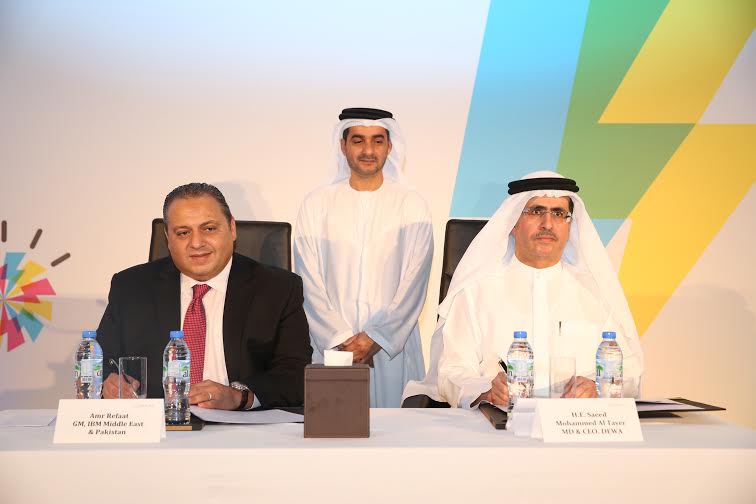DEWA, IBM sign MoU to make Dubai a ‘smart city’
MoU signed to create collaboration on smart grid technologies, knowledge-sharing and R&D.


Saeed Mohammed Al Tayer, MD and CEO of DEWA (right), and Amr Refaat, General Manager, IBM Middle East and Pakistan (left)
RELATED ARTICLES: DEWA to extend cables, connect substations in Dubai | DEWA starts work on 25km water network | DEWA releases tender for Phase II of Mohammed bin Rashid Solar Park
Dubai Electricity and Water Authority (DEWA) has signed a Memorandum of Understanding (MoU) with IBM to collaborate towards making the Emirate a smart city.
The agreement was signed by Saeed Mohammed Al Tayer, MD and CEO of DEWA, and Amr Refaat, General Manager, IBM Middle East and Pakistan, at a seminar on Oct 30 about the Dubai Smart City Initiative.
“DEWA is conducting these seminars to work more closely with its partners and stakeholders to support our contribution to the Smart Dubai initiative…to transform Dubai into the smartest city in the world within three years,” Al Tayer said.
Under the Smart City program, DEWA will launch three initiatives, namely solar power in houses and buildings, smart apps through smart meters and grids, and building infrastructure and charging stations for electric vehicles.
As part of the MoU, DEWA and IBM will collaborate on smart grid technologies, innovation centres, research and development programs, and industry knowledge-sharing.
“We believe in any journey you have to have the right stakeholder,” says Waleed Salman, Executive Vice President of Strategy and Business Development at DEWA, commenting on the partnership.
“We look at IBM as one of the strong business providers in terms of smart solutions. They have experience, they are in the region, globally,” Salman told Big Project ME.
Customer engagement will be a key part towards making the program work, officials said.
“We’re seeing a shift in the utilities in general globally towards getting much more attentive and sharper and engaging their customer so they’re no more a bill payer,” says Naji Najjar, Industry Leader, Energy & Utilities for Middle East and Africa, at IBM.
When customers are more aware of their energy consumption patterns, they would be more involved in reducing wastage, Najjar told Big Project ME on the side-lines of the seminar.
Moreover, making Dubai a smarter city will lead to better managing utility assets and optimising costs, he says.
“In utilities, assets are very critical,” he says. “You have a visibility on the life, the status, the health of the asset. You can assess the predictability of an asset to fail.”
“This data also gives you very valuable information on the quality of the network. So it could optimise a lot in terms of costs to send technicians out, it could give signals to help do predictive maintenance. And therefore it allows you to optimise when u need to replace a transformer, rather than do this routine maintenance, which could be very costly,” Najjar adds.
He also emphasizes the need for a smart city initiative in Dubai, saying that the Emirate’s development in the coming years will lead to increased consumption of electricity and water.
Within the program, there is plenty of room for private sector participation, officials say.
“The approach we have taken is engaging the private sector in the business. The private sector, they have the solutions, they have the technology, they have the know-how,” Salman says.
“To enable implementation of the smart grids it’s going to require participation of many companies. I think with the smart grid it would open a lot of opportunities for utilities to look at potentially new services to make the customer even more delighted. So there would be opportunities for partners that work with utilities to be able to enable these services,” Najjar says.



















